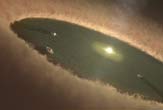Mysterious carbon excess found in infant solar system
Astronomers detected unusually high quantities of carbon, the basis of all terrestrial life, in an infant solar system around nearby star Beta Pictoris, 63 light-years away. "For years we've looked to this early forming solar system as one that might be going through the same processes our own solar system did when the rocky planets, including Earth, were forming," commented lead author Aki Roberge,* who began the research while at Carnegie's Department of Terrestrial Magnetism. "But we got a big surprise--there is much more carbon gas than we expected. Something very different is going on."

The research, published in the June 8, 2006, Nature, also released by EurekAlert, suggests that either carbon-rich asteroids or comets, unlike any in our own solar system, have vaporized, or that bodies outgassing carbon-bearing species such as methane contribute the curious carbon excess.
Dusty, gaseous disks around stars are the birthplaces of planetary systems. Carnegie researcher Alycia Weinberger, co-author of the study, explains: "Since we can't observe our own solar system as it was 4.5 billion years ago, we look at young stars to learn about the evolution of planet-forming disks. Ultimately, we want to understand the environments and processes around other stars that lead to the rise of life," reports Hindu.
Carbon has previously been detected around the star, which is about twice as massive as the Sun and lies 60 light years away. But those measurements were based on the relatively faint light that is emitted by carbon gas in the disc.
Now researchers have used NASA's Far Ultraviolet Spectroscopic Explorer (FUSE) to make the most accurate measurements yet of gas in a dusty disc. The disc lies "edge-on" as seen from Earth, so FUSE measured how much light from the star was absorbed after it passed through the disc.
"We measured gas in a radial cut, like a spoke," says team leader Aki Roberge of NASA's Goddard Space Flight Center in Maryland, US. "We can get quite sensitive observations because the star is pretty bright," informs New Scientist.
O.Ch.Subscribe to Pravda.Ru Telegram channel, Facebook, RSS!




